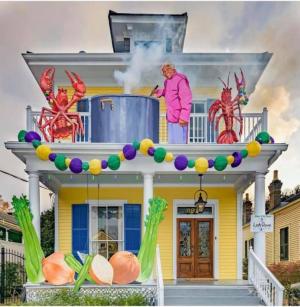Sussex Tech grad joins Mardi Gras celebrations
With Mardi Gras parades canceled due to the pandemic, a former Rehoboth resident now living in New Orleans said her new city has modified the celebration while raising money for out-of-work artisans.
Khyrstyne Quigley, a 2011 Sussex Tech grad and former member of the Rehoboth Beach Volunteer Fire Company, moved to New Orleans nearly five years ago.
“You can’t help but fall in love with the energy in this city,” she said. “It's not just a place to live, but a way of life that even when you leave will be burning inside your heart. Everyone could use a little New Orleans and Mardi Gras spirit all the way up in Delaware.”
The streets won’t be filled with sounds of marching bands, and residents won’t be awakened by the Skull and Bones Gang at dawn on Fat Tuesday, Quigley said.
“There will be no fighting over beads, or shoes, or coconuts, no Mardi Gras Indians marching through the streets,” she said.
To support the artists, hospitality workers and musicians who make the annual festivities possible, a new krewe has emerged. Krewes are social clubs that have organized the daily parades since the mid-1800s.
In January, the Krewe of House Floats announced a giving campaign to raise $100,000 for those financially affected by COVID-19 restrictions and help create what’s known as the Greatest Free Show on Earth.
The krewe has brought the spirit of the parades home by asking residents to decorate their homes as house floats for people to ride by, Quigley said. Several thousand homes are on the official parade route.
“Not only has this covered the city with Mardi Gras spirit, but there are house floats all over the world,” Quigley said. “Krewe of House Floats has set out to help those affected by the pandemic. Without them and what they do, New Orleans wouldn’t be what it is today. They are the backbone of this city.”
Mardi Gras can be traced to medieval Europe. Early celebrations and festive balls, including masked processions, were recorded in the New Orleans area in the middle 1700s. The first parade was held Feb. 24, 1857, by the Krewe of Comus.
In 1875, Louisiana declared Mardis Gras a state holiday. Wars, weather conditions and other events have in the past led to cancellation of some events, but the city has always celebrated Carnival.
Carnival season begins Jan. 6, which is Three Kings Day, also known as Epiphany, and marks the day observers believe the three wise men visited Jesus after his birth. Mardi Gras day, which is Fat Tuesday, occurs on a different day each year because Easter Sunday changes each year. Fat Tuesday is always the day before Ash Wednesday; in 2021, Fat Tuesday is Feb. 16.
To learn more or to donate, go to kreweofhousefloats.org.

























































